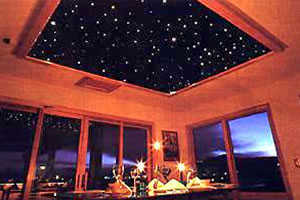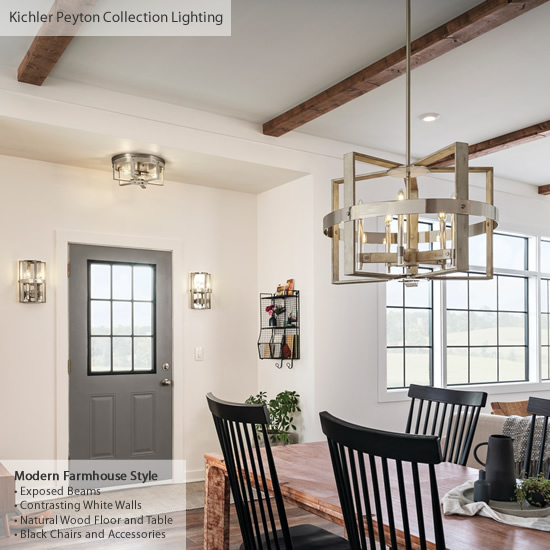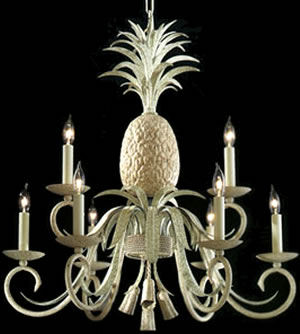Landscape Lighting Plan
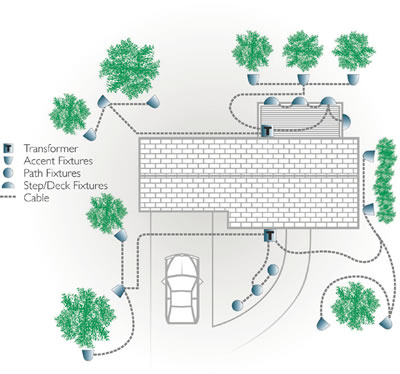
Any do-it-yourselfer can install 12 volt landscape lighting. What makes it look professional is a great lighting plan.
The first step to create a landscape lighting plan is to draw a sketch or map of your yard.
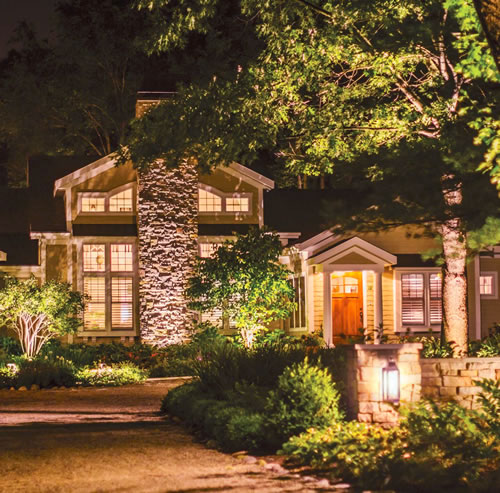
What to Light
Draw in any of these features you want to light onto your sketch.
- Pathways
- Steps & Stairs
- Entrances
- Lawn Ornaments
- Fountains or Water Feature
- Natural Features
- Areas an intruder might hide
What NOT to Light
Mark on your plan any areas you don’t want to light
- Garbage Cans
- Heating or Air Conditioning Units
- Fuel Tank
- Dog Run
- Wood Pile
Be sure to position fixtures so lights won’t shine into people’s eyes, into windows or into other people’s yards.
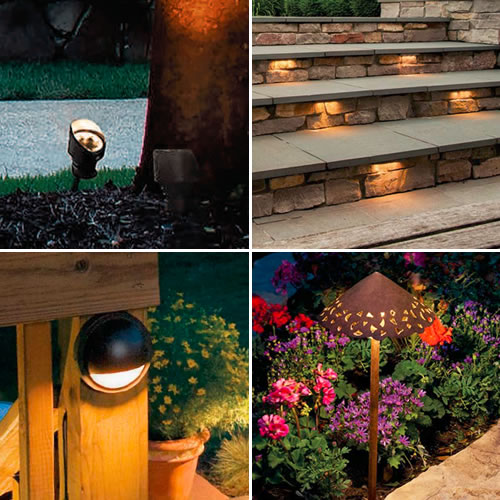
How to Light It
Next decide how to light. There are a lot of options.
- Path Lighting
- Step Lighting
- Deck Lights
- Accent, In-Ground or Other Landscape Lighting
Mark each of these on the sketch of your yard.
Decide where you can put your transformer. It is easiest if you have outside outlets.

Cable Layout
Next, design your cable layout. The dotted line in the layout above is the cable.
Draw a line from the transformer to each of the fixtures.
If you are using newer LED fixtures, you don’t have to worry about voltage drop. You don’t have to worry about cable gauge and you are really unlikely to over drive the transformer.
If you are using halogen or xenon bulbs, you need to be sure to avoid straight runs or the lights closer to the transformer will be brighter than the ones down the line. If your runs are going to be very long, use higher gauge cable for the main leg.
Measure your cable. Be sure to get extra so it isn’t tight. Cable is not expensive.
Add up the wattage of the fixtures. Your transformer should handle this much wattage.
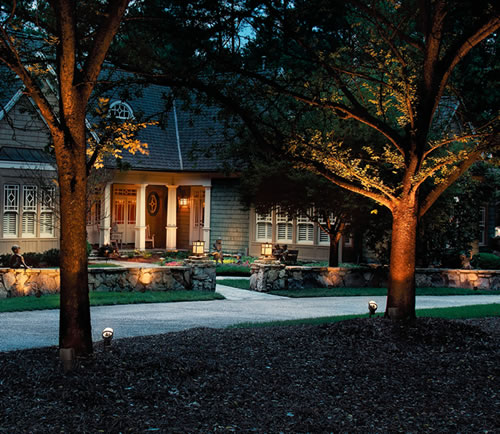
A Little Now, More Later
You don’t have to do everything at once. Purchase the transformer for your ultimate plan, then add the fixtures little by little.
Or buy low cost fixtures now and upgrade to higher quality longer lasting fixtures later.
Extras
Consider adding:
- Timer to turn the lights on and off at predetermined hours.
- Dusk to Dawn Photocell
- Remote Control
- Motion Detector
Installing Your Landscape Lighting
Installation is easy and fast
Follow any instructions that come with your lighting.
- Screw the transformer to the wall near the outlet one foot above the ground.
If you have a photo cell, mount it away from any artificial light sources, such as street lights or light from your windows. - Lay fixtures as close as possible to where they will be installed.
- Lay out the cable along your plan. Be sure to keep it loose.
- Connect the cable to each fixture and to the main cable using cable connectors.
- Connect the low voltage cable to the transformer.
Plug in the transformer. - Test the system. Make sure everything is lighting up before you bury the cable.
You might want to wait until the sun goes down to make sure that everything is right. - Cover the cable with mulch or gravel where it runs through beds.
Cut a slit in the grass and push it in where it crosses the lawn.
Landscape Lighting Kits are reasonably priced and easy to install. Kits are available with spot lights, flood lights or both.
Kichler LED Landscape Lights >
Versatile LED Solutions Kichler LED accent lighting helps showcase landscape features with true, clear, warm, white light without intruding on the scene.
Hinkley Hardy Island Landscape Lighting Collection >
Spot lights, flood lights and wall wash lights coordinate with pathlights, well lights, deck lights, steplights and brick lights for a complete landscape lighting design.
Hinkley Nexus Landscape Lighting >
High quality, high style aluminum path lights, deck lights, wall lights and sign lights. LED Finished in bronze.
A variety of inground and well lights and kits from Eurofase, SLV Lighting, Kichler, Dabmar, Hinkley and Hadco Lighting. Light sources are LED, MR16, GX53/GX53, PAR20 or PAR30.
More Landscape Lighting >
Landscape Lighting Kits >
Discover more from my design42
Subscribe to get the latest posts sent to your email.


